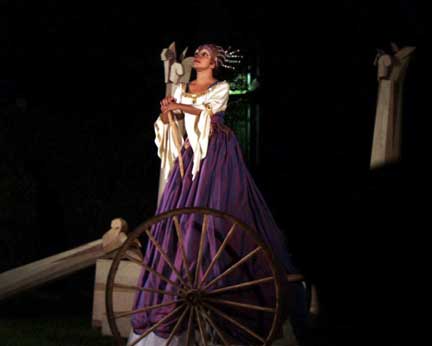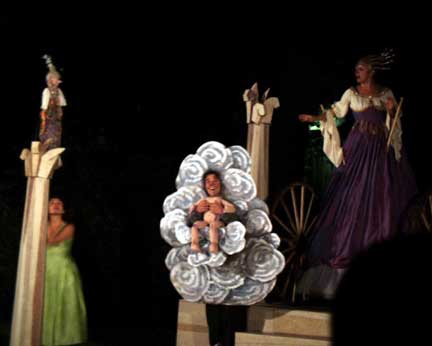
 photo by Donald Devet |
by Mettawee River Theater Company Cathedral garden, St. John the Divine reviewed by Donald Devet |
The Roman gods of ancient mythology possessed awesome powers including the ability to manipulate the lives of mortals. Yet these omnipotent creatures were not immune to the vagaries of human emotions -- rage, jealousy and love at first sight. In Ralph Lee's adaptation of Moliere's little known 1671 play, Psiche, it is the pursuit of love that makes the gods' world go round. In the eyes of the gods, there is no neutrality when it comes to love. One look at Psyche's unrivaled beauty either inspires head over heels adoration or raging envy. Venus, the goddess of love and beauty, can't stand a rival, especially a mere mortal. But her plans for her son, Cupid, to wreak vengeance on Psyche backfire. Cupid is smitten with Psyche. What happens next is like a plot device straight out of Beauty and the Beast: Cupid whisks her away for safekeeping to a magical palace where he remains invisible. Psyche's jealous sisters lead her to believe that her captor is a monster. When Cupid reveals his true identity, he leaves Psyche who must face his mother alone. Cupid may be renowned for his bow and arrow work, but when it comes to standing up to mom, his quiver is empty. Venus sends Psyche on a mission to Hades to fetch a box of beauty from Proserpina, queen of the underworld. The box, a la Pandoraís, is too tempting for Psyche to resist. Upon opening it, she falls into a swoon. Only Jupiter's intervention puts a stop to Venus envy. The god makes Psyche immortal so she may dwell forever with Cupid in heaven. This outdoor evening performance had the feel of both A Midsummer's Night Dream and The Tempest where anything is possible. Cupid floats in on a cloud. A ten foot tall Venus gracefully glides across the grass. Vulcan lifts huge boulders. Zephyr conjures up the winds. And Jupiter sits in judgment above it all. Six barefoot actors play thirteen parts-- donning masks, manipulating rod puppets and deftly delivering speeches from Moliere as well as from Thomas Heywood's 1640 play, Loveís Mistress. Elaborate costumes by Casey Compton mixed well with Leeís whimsical masks and puppets. Karen Hansen lent a mystical atmosphere with her assortment of percussive instruments. But the real magic of Psyche was the setting itself. Under the towering spires of the massive Cathedral of St. John the Divine, an audience of mortals huddled together in the dark to witness a timeless story of love and envy. The gods would be pleased. Copyright © 1999 Donald Devet |
|
 photo by Donald Devet |
|